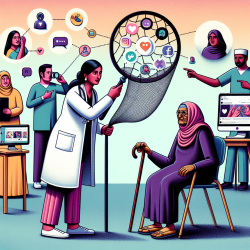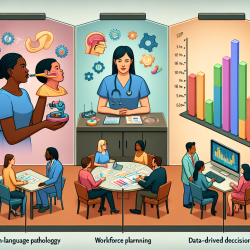Introduction
The landscape of healthcare is evolving rapidly, with social media and the internet playing pivotal roles in reshaping patient-practitioner interactions. A recent study titled Perspectives from the Patient and the Healthcare Professional in Multiple Sclerosis: Social Media and Participatory Medicine provides valuable insights into how these digital platforms are transforming the management of multiple sclerosis (MS). This blog explores how practitioners can leverage these findings to enhance their skills and improve patient outcomes.
Participatory Medicine: A New Era of Patient-Practitioner Interaction
Participatory medicine is a model of healthcare that emphasizes active patient involvement in decision-making. The study highlights that patients with MS are increasingly using the internet and social media to become informed about their condition, treatment options, and clinical trials. This shift empowers patients to engage more actively with healthcare professionals (HCPs), fostering a collaborative approach to care.
Practitioners can enhance their skills by embracing this model, encouraging open communication, and supporting patients in their quest for knowledge. By doing so, they can build trust and facilitate shared decision-making, ultimately leading to improved patient satisfaction and outcomes.
Promoting MS Research Through Social Media
Social media has become a powerful tool for promoting and fostering MS research. Patients are using these platforms to share their experiences, participate in clinical trials, and even influence trial design. For practitioners, this presents an opportunity to engage with patients beyond the clinical setting, encouraging them to contribute to research and stay informed about the latest advancements.
By actively participating in online communities and discussions, practitioners can stay updated on patient perspectives and emerging trends in MS research. This knowledge can be invaluable in tailoring treatment plans and improving patient care.
Enhancing Communication and Patient Support
Social media provides a platform for patients to connect with others facing similar challenges, offering peer support and reducing feelings of isolation. Practitioners can leverage these networks to enhance communication with patients, providing timely information and support.
By establishing a presence on social media, practitioners can share educational content, answer patient queries, and provide guidance on managing MS. This proactive approach can help patients feel more informed and empowered, leading to better adherence to treatment plans and improved health outcomes.
Addressing Privacy and Ethical Considerations
While social media offers numerous benefits, it also raises concerns about privacy and confidentiality. Practitioners must navigate these challenges carefully, ensuring that patient information is protected and ethical standards are maintained.
By staying informed about privacy regulations and best practices, practitioners can use social media responsibly, fostering a safe and supportive environment for patient engagement.
Conclusion
The insights from the study on social media and participatory medicine in MS care underscore the potential for practitioners to enhance their skills and improve patient outcomes. By embracing these digital tools, practitioners can foster stronger patient-practitioner relationships, promote research, and provide better support to their patients.
To read the original research paper, please follow this link: Perspectives from the Patient and the Healthcare Professional in Multiple Sclerosis: Social Media and Participatory Medicine.










